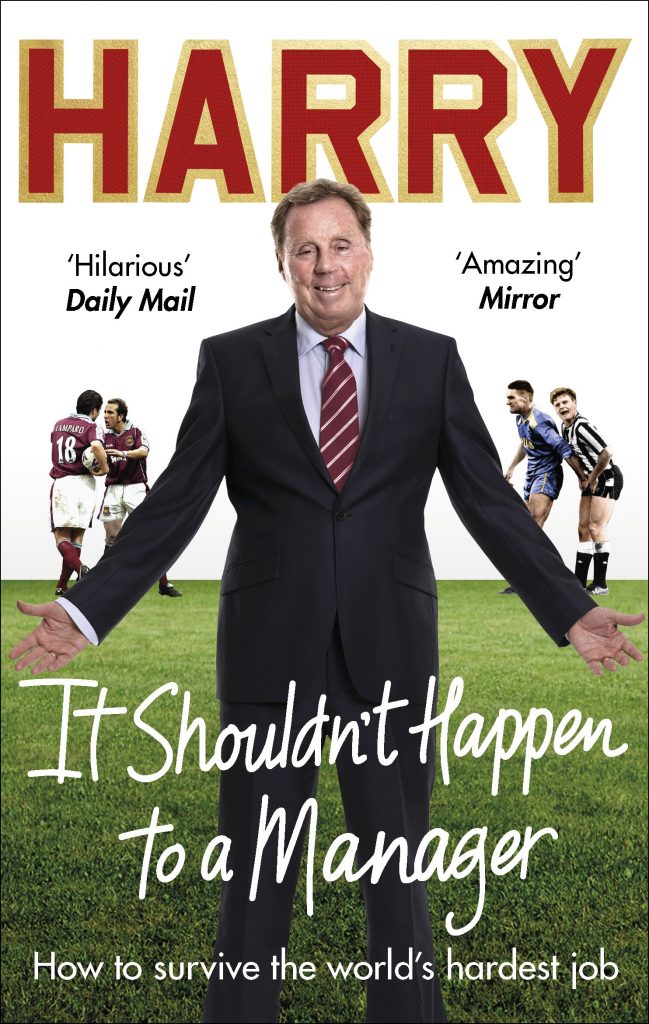Book Review: It Shouldn’t Happen to a Manager – How to survive the world’s hardest job by Harry Redknapp

Since his stint in the Australian jungle on I’m a Celebrity last year, Harry Redknapp has fast become the nation’s favourite former football manager (unless, of course, you’re a Southampton fan – in which case however many critters Harry ate or dingo dollars he won, he’s probably still not on your Christmas card list). Whatever your thoughts on him, there’s no doubt that he’s certainly a character both on the touchline and off it, and if anyone has a story or two to tell from his footballing career, it’s Harry Redknapp.
Published in 2016, when he was better known as a football manager (still managing Jordan before going on to manage Birmingham City in 2017) rather than a ‘showbiz’ celebrity, It Shouldn’t Happen to a Manager (one of several books to have been published by Harry Redknapp and the most recent aside from his 2019 The World According to Harry) shares some of Harry’s stories from over five decades in football and his views on everything from agents to scouting to the modern obsession with sports science and stats. And, without doubt, there’s a sense in which Harry is one of the old guard of managers who belong to another era when footballers thought nothing of a post-match meal of fish and chips (and a pre-match pint or two), when managers could bawl players out without the threat of them storming off or calling in their agent, and when clubs couldn’t afford to put teams up in hotels for away matches let alone fly them by private jet.
Football has, inevitably, evolved and in lots of ways for the better, but Harry’s simple, common-sense attitude rings true on a number of fronts, not least in his insistence on the need to see a player live to judge them. Videos and stats can show you so much, but there’s nothing that compares to watching a player on a muddy pitch on a cold December day in England to see if they can hack it, as many fans will attest. Similarly, Harry’s concerns about the way that technology can get in the way of team spirit seems to be a simple but accurate truth. Whereas coach journeys, he says, used to be a great opportunity for players to bond, nowadays most players put their headphones on and don’t talk to anyone. He offers a perceptive point, too, about the amount of injuries in the modern game compared with earlier eras, despite the rise of sport science. Whilst he acknowledges the modern game is perhaps faster and more intense, he also points out the physicality of bygone eras, in which players kicked lumps out of each other on pitches that were more like dirt tracks than carpets.
Though in many ways Harry seems to be a product of a different time, in some ways he’s a timeless manager, not least in the emphasis he placed on player management and a holistic approach to understanding and managing individuals. Again, though, simplicity seems to be the key – as in the way he built his “tactics” on getting the ball to the best player! Although, I’m not entirely sure how successful this approach would be in motivating players who clearly know they’re not top dog – but it seemed to work at Bournemouth, Tottenham and Portsmouth. Harry also claims that the gap between divisions isn’t as wide as people think – whilst the quality may be noticeable between teams and leagues, there are individual players who are capable of playing higher up the football pyramid but have got stuck at a certain level. Similarly, Redknapp asserts there are players at top teams who struggle when dropping down the leagues. He seems to advocate the fact that there is a degree of luck, of being in the right place at the right time, on which footballers’ careers are made or broken. And, in much of what he says, Redknapp seems to hit the nail on the head.
In all, this is a really easy and enjoyable read from one of football’s last real characters. It sheds light on life as a football player and manager and the changing face of both. It also holds football’s past up against its present, highlighting the differences, both for better and for worse. At its crux, Redknapp maintains, football is a simple game, but the modern way seems to try and overcomplicate things and the old guard are at the risk of being left behind. But football’s loss has been entertainment’s gain in the form of Harry Redknapp, who comes across as an eminently likeable, straightforward and down-to-earth man – just the sort perhaps that seems to be missing in large part from football today.
Jade Craddock